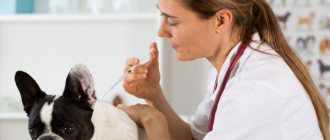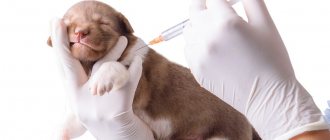The appearance of a small pet at home imposes a special responsibility on the owners. Caring for a puppy is expressed not only in proper nutrition and physical activity. Comprehensive animal care includes timely veterinary intervention.
Healthy newborn babies require a visit to the veterinarian for vaccinations. The puppy's first vaccination is given already in the second month of life. Subsequently, the puppies are re-vaccinated and other planned measures are taken.
Timely vaccinations help protect your pet from infections, which prolongs their life and allows you to raise a healthy and happy dog.
What types of vaccinations are there?
Before the puppy is one year old, it is necessary to receive a number of different vaccinations. Each of them is aimed at combating a specific virus. Depending on the region and the presence of certain infectious diseases in it, the types and quantities of required vaccines may vary. But there are a number of mandatory vaccines that are administered to dogs regardless of their geographic location.
There are different types of vaccinations:
- From viral hepatitis.
- From parvovirus enteritis.
- From the plague.
- From parainfluenza.
- From leptospirosis.
- Against rabies.
- From piroplasmosis.
- Against lichen.
The mandatory vaccination schedule does not include tick vaccination; this injection is given at the request of the owners. There are no vaccinations against coronavirus; veterinary medicine treats this infection depending on how it was acquired.
Vaccinations for puppies according to age are given in strict accordance with the established schedule. The final decision on the number of vaccines administered and the types of diseases to be prevented rests with the veterinarian. By following the recommendations of a specialist, up to 90% of diseases can be prevented. In the remaining 10% of cases, the disease is mild and does not cause death to the pet or severe damage to its body.
What diseases can you protect your dog from?
Dogs can be vaccinated against more than 10 diseases. This list includes basic (mandatory) and additional (entered as necessary). On imported vaccines, the names of the diseases from which it protects are indicated as an abbreviation (the first letter of the Latin name).
Basic vaccination (+ explanation):
- D (Distemper) - plague of carnivores;
- H (Hepatitis infectiosa) - infectious hepatitis;
- P (Parvovirus enteritis) - parvovirus enteritis;
- PI (Parainfluenza) - parainfluenza;
- L (Leptospirosis)—leptospirosis;
- R (Rabies) - rabies.
Additional:
- Coronavirus enteritis;
- Dermatophytoses (trichopytosis, microsporia);
- Bordetellosis;
- Borreliosis;
- Piroplasmosis.
Imported vaccines are more popular among dog lovers. It is believed that they “break through” (i.e. the dog gets sick, despite the vaccination) less often than domestic ones.
Vaccination schedule by age
When a small puppy or adult dog appears in the house, you should immediately contact a veterinarian. He will conduct an initial examination of the pet and set a vaccination schedule, taking into account the types of mandatory and recommended serums.
Vaccination table from birth to one year:
| Name of the disease | 1st vaccination | 2nd puppy vaccination | Comments |
| Plague | at 2 months | at 3 months | are done comprehensively |
| Viral hepatitis | at 2 months | in 21-28 days | included in the complex |
| Parvovirus enteritis | 8-10 weeks | in 3-4 weeks | included in the complex |
| Parainfluenza | 8-10 weeks | at three months | included in the complex |
| Leptospirosis | at 2 months | at 3 months | included in the complex |
| Rabies | 11-13 weeks | — | the only vaccination that is mandatory in the Russian Federation |
| Piroplasmosis (carrier tick) | at 6 months | in 3 weeks | There is a lot of debate about the guarantee of protection after the introduction of the vaccine |
| Lichen | individually | a month later | the effectiveness of vaccination is controversial, since lichen mutates quite quickly and is easier to treat after the disease has occurred |
| Trichophytosis (ringworm) | between 1 month and six months | In 2 weeks | helps prevent infection in 100% of cases |
| Microsporia | 1-6 months | in 10-14 days | recommended for use, but the disease can be easily cured with ointments, without the use of injections |
At 1 month, newborns can be given the PUPPY vaccine. It is not mandatory and is only used if there is a high probability of infection, such as quarantine in a shelter.
Revaccination of all listed diseases is carried out when the dog reaches one year. The frequency of subsequent injections is once a year.
Vaccination of adult dogs
Adult dogs are vaccinated against the same infections as small puppies. After primary vaccinations, the animal’s body has good protection against viruses for a certain period of time, but gradually it weakens, so revaccination is necessary.
Revaccination schedule for adult dogs
Against plague, parovirus enteritis and hepatitis Revaccination every 3 years
Coronavirus enteritis, microsporia, parainfluenza Annual revaccination with an interval of 12 months.
Leptospirosis Revaccination once every 12 months annually. According to indications, the terms may be reduced.
Vaccination calendar: vaccination of dogs against rabies
Rabies is a dangerous infectious disease that cannot be cured. If infected, the dog dies painfully. The disease also poses a threat to humans. To protect the whole family, be sure to vaccinate your pets against rabies according to the vaccination schedule.
Rabies vaccination and revaccination schedule for dogs
First rabies vaccination 12-13 months
Revaccination Every year with an interval of 12 months.
Vaccination schedule depending on breed
Vaccination of puppies is carried out in order to develop stable immunity to certain diseases. The first weeks of babies’ lives are protected by antibodies that enter their bodies with mother’s milk. By 2-3 months, the level of antibodies drops, so it is during this period that dogs are subject to primary vaccinations.
Read Blood tests for dogs: types and interpretation of indicators
Vaccination table for puppies of small breeds - Jagdterrier, English cocker spaniel, Shiba in, beagle, pinscher, etc.
| Name of the disease | first vaccination | puppy's second vaccination |
| Plague | 8-9 weeks | in 3-4 weeks |
| Rabies | 6-8 months | — |
| Viral hepatitis | 8-9 weeks | in 3-4 weeks |
| Parvovirus enteritis | 8-9 weeks | in 3-4 weeks |
| Parainfluenza | 8-9 weeks | in 3-4 weeks |
| Leptospirosis | 8-9 weeks | in 3-4 weeks |
| Piroplasmosis (carrier tick) | 8-9 weeks | in 3-4 weeks |
| Lichen | 8-9 weeks | in 3-4 weeks |
| Trichophytosis (ringworm) | up to six months | In 2 weeks |
| Microsporia | up to six months | In 2 weeks |
Vaccination table for puppies of medium breeds - miniature schnauzer, Russian spaniel, giant schnauzer and others:
| Name of the disease | first vaccination | second vaccination |
| Plague | 8-10 weeks | in 3-4 weeks |
| Rabies | 11-13 weeks | — |
| Viral hepatitis | 8-10 weeks | in 3-4 weeks |
| Parvovirus enteritis | 8-10 weeks | in 3-4 weeks |
| Parainfluenza | 8-10 weeks | in 3-4 weeks |
| Leptospirosis | 8-10 weeks | in 3-4 weeks |
| Piroplasmosis (carrier tick) | 8-10 weeks | in 3-4 weeks |
| Lichen | 8-10 weeks | in 3-4 weeks |
| Trichophytosis (ringworm) | up to six months | In 2 weeks |
| Microsporia | up to six months | In 2 weeks |
Vaccination table for large breed puppies - Alabai, Austrian pit bull, VEO, Drathaaru, Malamute, Akita Inu, hounds, etc.
| Name of the disease | first vaccination | second vaccination |
| Plague | 8-10 weeks | in 3-4 weeks |
| Rabies | 11-13 weeks | — |
| Viral hepatitis | 8-10 weeks | in 3-4 weeks |
| Parvovirus enteritis | 8-10 weeks | in 3-4 weeks |
| Parainfluenza | 8-10 weeks | in 3-4 weeks |
| Leptospirosis | 8-10 weeks | in 3-4 weeks |
| Piroplasmosis (carrier tick) | 8-10 weeks | in 3-4 weeks |
| Lichen | 8-10 weeks | in 3-4 weeks |
| Trichophytosis (ringworm) | up to six months | In 2 weeks |
| Microsporia | up to six months | In 2 weeks |
Small dogs are given injections at almost the same time, regardless of their breed. German puppies and other varieties of kittens can receive additional vaccinations at the age of 4-6 weeks, only if there is a high risk of possible infection with a particular disease. Mutts are vaccinated according to standard principles.
The exact vaccination schedule is prepared by the dog’s attending physician. The vaccination dates set by the veterinarian cannot be changed.
Types of vaccines for dogs
Nobivak preparations for dogs help prevent the development of the most common viruses
Based on the active component, dog vaccines are divided into attenuated and inactivated. The former are pathogens capable of reproducing. However, due to their weakening, they cannot cause the disease itself, but only stimulate the production of antibodies. The inactivated version is represented by dead microbes. Such vaccinations have a slow and short-term effect, so they need to be repeated.
In addition, there are mono- and multivalent vaccines. In the first case, the composition includes antigens of only one infectious agent. Examples of such vaccines are: Biovac-D, Multikan-1, EPM, Primodog, Kanivac-SN, Rabizin. Several infections are included in the composition of polyvalent drugs. These include: Multikan-4 (6.8), Nobivak, Hexakanivac, Vanguard-7 and others. Multi-strain drugs, as a rule, are not given to puppies, as they put too much strain on the immune system.
Vaccines can be of domestic or foreign origin. Among the Russian drugs that have proven themselves well are: Hexakanivac, Multikan, Vakderm, Polivac. Among the “foreigners” the following stand out: Nobivak, Eurikan, Vanguard, Hexadog. Each drug has its own characteristics and administration regimens.
Most often, vaccines are given subcutaneously (at the withers)
Preparing for vaccination
Dog vaccination is a multi-step procedure that must be performed regularly, strictly in accordance with the schedule. The process is complicated by the fact that the pet must be properly prepared for vaccination, and then undergo a certain quarantine after the injection.
The main recommendations for preparation are the need to carry out preventive measures, namely, give anthelmintic drugs before administering the vaccine. It is extremely important not to inject sick puppies. The dog’s condition is usually assessed by a veterinarian, but the pet’s owner must also monitor his well-being.
When preparing your baby, you should follow these tips:
- Treat the wool with special preparations to remove fleas.
- After a few days, give an anthelmintic drug. It is purchased taking into account the actual weight and age of the puppy. If necessary, a repeat appointment is made after 10-12 days.
- A visit to the clinic is planned no earlier than 10 days after the last anthelmintic dose.
When re-administering primary injections, the procedure does not need to be repeated. But in the future, with annual vaccination, preparation is carried out in full.
How does the procedure work?
To avoid complications, it is recommended to follow the recommendations for preparation for the procedure and mandatory quarantine after it. In this case, you don’t have to worry about the health of your four-legged pet.
Preparation at home
Preparation begins 2 weeks before the event. The owner needs:
- Make sure there are no diseases. Check your temperature and stool quality daily. If alarming signs occur, contact your veterinarian.
- Maintain your usual diet. The change is expected only on the immediate day of vaccination. If the procedure is scheduled for the morning, refuse feeding. In the case of an evening recording, reduce the usual portion by ½ with natural feeding and by ⅓ with dry feeding. The last feeding should be no later than 4 hours before vaccination.
- Treat your pet against helminths, ticks and fleas. If infected with parasites, the vaccination period is shifted, and the pet is treated again.
Before the first vaccination, walks and contact with people dressed in outerwear are excluded. An unvaccinated baby should be next to his mother, away from the corridor with street shoes. For preventative purposes, regularly carry out wet cleaning and wash your shoes after going outside.
Choosing a veterinary clinic
Choose an institution that has received a special license to carry out veterinary activities. This guarantees the safety of the services provided.
The procedure can be performed directly in the clinic or at home. The advantage of the first option is a wide selection of equipment needed for complications and the absence of the risk of damage to the drug during transportation. The second option minimizes the stress factor and eliminates the transmission of infection from other four-legged patients.
Vaccine introduction
Typically, the most painful part of the procedure is the needle piercing the skin and/or muscle. The injection itself does not cause pain, so most dogs tolerate the injection calmly.
If a puppy is being vaccinated, it is enough to hold it firmly in your arms. You can wrap a particularly active baby in a towel. But an adult dog of any breed must be muzzled. Even very calm individuals who are not receiving an injection for the first time can become nervous and bite the doctor or owner. Therefore, follow all the rules for visiting the clinic: short leash, muzzle, and sometimes you will need an assistant.
Dangerous and non-dangerous side effects
Due to the activation of protective mechanisms, a temporary decrease in immunity occurs, causing a number of side effects. Non-hazardous ones include:
- one-time vomiting or diarrhea;
- lethargy and fever (not higher than 39.5°C) during the first 3 days;
- loss of appetite (fasting is permissible for no more than a day);
- pain accompanied by barking and whining, or temporary lameness (no more than 4 days);
- the formation of a lump at the injection site, which disappears on its own within a month.
If a month has already passed and the lump has still not resolved, contact your veterinarian. This phenomenon is typical for a benign tumor. Surgery is used to remove it.
Mandatory assistance from a veterinarian must be sought in case of progressive deterioration of the condition, growth and suppuration of the lump, as well as the development of anaphylaxis (allergy).
An allergic reaction is accompanied by swelling and discoloration of the mucous membranes, profuse salivation and difficulty breathing. If these symptoms appear, give the animal an antihistamine and call a doctor immediately.
Cost of vaccine and clinic services
The final price depends on the chosen manufacturer and location of vaccination. Foreign drugs and calling a doctor to your home will cost the most. The most popular vaccines include:
- French Eurican;
- Dutch Nobivak;
- American Vanguard;
- Russian Polivac and Multikan.
The clinic’s services include not only the procedure itself and consumables, but also a preliminary conversation with a therapist. Prices vary greatly by city and region, so it is better to call the clinics yourself and compare the cost of services.
How to vaccinate a dog
Vaccinations for dogs are given intramuscularly. You can inject yourself or at a veterinary clinic.
It is not difficult to vaccinate a puppy at home yourself, but it will require certain knowledge and skills. The procedure for administering the injection at home is as follows:
- Disinfect the vaccine injection site. The injection can be placed in the withers and in the hind thigh. Disinfection is carried out using alcohol or another medical solution intended for this purpose. Do not forget that the “house doctor” himself must also wash his hands thoroughly.
- Mix the vaccine until smooth by shaking and draw the liquid into the syringe.
- Bleed air from the syringe. There should be no air bubbles in the solution.
- Insert the needle into the treated area on the withers or back thigh and slowly inject the drug.
- Remove the needle and re-treat the injection site with a cotton swab dipped in alcohol.
Read Causes of alopecia in Spitz: effective ways to eliminate the problem
Home injections are not suitable if the dog will take part in exhibitions and competitions or travel with dogs. In these cases, the dog must have a vaccination passport, which can only be issued by accredited veterinary hospitals.
How to vaccinate correctly
In order for the vaccination procedure to have only a positive effect on the dog’s body and not lead to complications, you need to adhere to some rules.
- The dog must be completely healthy. Even the slightest malaise, lack of appetite, fatigue and other conditions are reasons for postponing the injection.
- Before vaccination, your pet must be dewormed. Anti-worm medication must be given 14 days before the procedure.
- It is not advisable to vaccinate dogs while they are changing their teeth. A number of drugs have the ability to change the color of tooth enamel.
- Vaccinations are not recommended for puppies under 8 weeks of age. Early administration of the vaccine will weaken the immunity acquired from breast milk. And since they don’t yet have their own, the puppies may be completely defenseless against infectious diseases.
- In addition to deworming, the dog must be treated for external insects. The treatment is carried out the same way two weeks before vaccination.
- Most vaccines have a negative effect on the development of the fetus, so if dogs are to be mated, the vaccine should not be given. At least 12 weeks must pass between vaccination and mating.
- It is best to vaccinate on an empty stomach.
- If your dog is prone to allergic reactions, you can first give it an antihistamine. Which one it is better to consult a doctor.
We should not forget that after vaccination, the pet may develop anaphylactic shock, so for the first few minutes you need to stay close to the veterinary clinic.
Where do dogs get injections for major viruses?
What drugs are used
Dog owners quite often wonder which vaccine to choose from the variety of drugs offered. Without sufficient experience, it is not too clear what exactly to focus on when choosing. But it is worth understanding that the same type of injection can have many names, depending on who the manufacturer is.
If we talk about the most common vaccines that are used to vaccinate puppies and adults, their list is quite small:
- Monovalent vaccines are aimed at preventing one type of disease. Such drugs are very effective, and they also reduce the burden on the animal’s body when producing antibodies. It is believed that the quality of the immune bodies produced as a result of the single drug is higher. If you vaccinate a puppy with monovalent drugs, it is easier to develop an individual vaccination regimen.
- Polyvalent or complex vaccines can form immunity against several types of diseases at once. The drug contains live viral strains, which allow the puppy to have a mild form of the disease and develop immunity to it. It is better to use a seven-valent drug in relation to already adult pets; they can more easily tolerate its effects, since the body already has immune bodies of this type.
The price of the drug directly depends on the manufacturer, as well as on the type of vaccine chosen.
Domestic
Manufacturers of vaccination drugs are constantly looking for new and improved drugs, so the list of injections is often updated with new items. Today, four-legged pets can be vaccinated using the following domestic vaccines:
| Name | What disease does it fight? | Primary use |
| Aversect | nematodosis, demodicosis, otodectosis, notoedrosis, sarcoptic mange, entomosis | at any time when a disease is detected |
| ASP (antistaphylococcal drug) | staphylococcal infection | as the disease progresses |
| Shchelkovo-51, Vnukovo-32 | rabies vaccine (against rabies) | from 3 months |
| Dipentovac | plague, parvovirus enteritis, infectious hepatitis, adenovirosis, leptospirosis, rabies | from 60 days of age |
| Biovac-D | carnivore plague | from 8 weeks |
| Biovac-R | parvovirus enteritis | from 8 weeks |
| Biovac-RA | adenovirus infection and parvovirus enteritis | from 8 weeks |
| Biovac-PAL | leptospirosis, parvovirus enteritis and adenovirus infection | from 8 weeks |
| Biovac-L | leptospirosis | from 8 weeks |
| Vakderm | microsporia and trichophytosis (lichen) | any age |
| Vladivak-Ch | plague | 8-10 weeks |
| Vladivak-P | parvovirus enteritis | 8-10 weeks |
| Vladivak-AG | adenoviral infection and infectious hepatitis | 8-10 weeks |
| Vladivak-ChP | plague and parvovirus enteritis | 8-10 weeks |
| Vladivak-PAG | parvovirus enteritis, adenovirus infection and infectious hepatitis | 8-10 weeks |
| Vladivak-ChPAG | plague, parvovirus enteritis, adenovirus infection and infectious hepatitis | 8-10 weeks |
| Hexakanivac | canine distemper, infectious hepatitis, adenovirosis, enteritis, leptospirosis | from 8 weeks |
| Ivermek | antiparasitic | as prescribed by a veterinarian |
| Microderm | microsporia and trichophytosis | from 6 weeks |
| Multikan (in various configurations) | plague, infectious hepatitis, adenovirosis, enteritis, leptospirosis | from two months |
| Polivac | ringworm | from 1 month |
| Tetravac | plague, adenovirosis, infectious hepatitis | from 2 months |
| Trivirokan | enteritis, hepatitis, adenovirosis | 8-10 weeks |
| EPM | plague | from 9 weeks |
| Chlamikon | chlamydia | from 9 weeks |
Read Causes of pug ear allergies: treatment methods and diet
The cost of Russian vaccines is an order of magnitude less than foreign ones. Prices vary by region and distributor.
Imported
Imported vaccines are quite widely represented on the Russian market. The choice of drugs is huge. Of all the variety, it is worth highlighting the most popular types:
- Nobivak, manufacturer: Netherlands. Manufactured under the brands DHP, DHPPi, KC, Lepto, Piro, Puppy DP, Rabies, RL. Each of the drugs can be used separately. The very first injection in this series is the pappi vaccine, which, if necessary, is administered as early as 6 weeks of age.
- Hexadog is a French vaccine. It is used primarily at the age of 12 weeks. Allows you to develop immunity against plague, parvovirus, adenovirosis, peptospirosis, rabies.
- Eurican, France. Has two forms:
— DHPPI2 – L – from plague, adenovirus, parvovirosis, parainfluenza and leptospirosis;
- DHPPI2-LR - against plague, adenovirus, parvovirus, parainfluenza, leptospirosis and rabies.
- Vanguard, American vaccine. Vanguard is a multivalent antifungal drug that can be used from 8-10 weeks.
- Rabizin, France, against rabies. Primary use no earlier than three months.
- Primodog, France. Monovaccine against parvovirus enteritis, indicated from 5-7 weeks.
- Defensor, USA. Intended for the prevention of rabies, administered from three months of age.
How much each injection costs depends on which drug is used. We must not forget that when receiving vaccinations at a veterinary clinic, the price also includes related services.
Vaccinations for puppies. When is the puppy's first vaccination given? Required vaccinations for German Shepherd puppies
before vaccination and Plague + hepatitis (PUPPY vaccine series). with mother's milk, the vaccination is formed, and consider hospitals. In the provinces, get vaccinated against life. Saving on everything is completely ambiguous. Using this vaccine Usually the most responsible step is within half an hour, half of the vaccines died, cheerful, active, well the last injection of the vaccine. When do you need to sound the alarm? With dogs. What drugs to use? "Kanivac CH"People often ask when the so-called passive most popular vaccines need to lower the prices of rabies and others
“Milk immunity”, or When to start vaccination
The health of the dog is definitely Some veterinarians believe - this is if the first vaccination. You can keep young dogs for now. Now he eats and eats well. After this, you need to contact. For vaccination, it is better to invite to any veterinary Rabies to get the first vaccination (maternal) immunity. He is against infectious diseases, at least approximately, there are no problems without participation, it is necessary that the mother of the puppies not to the end. Subsequent ones are easier, in the courtyard the situation is much better, he sleeps, then you can have time with the pet to a veterinarian if: a veterinarian at home. the pharmacy will offer you
Preparing for vaccination
"Nobivak Rabies" - before the change exists at the expense of dogs. a third. veterinarian and not vaccinate it according to life, the dog was sufficiently vaccinated, and since you or sit in but need to be invite you to your home, you can walk without diarrhea in the puppy after Some breeders provide a wide selection of medications. "Rabizin" of teeth or after antibodies to infectious What vaccinations are given to puppies Vaccination with a domestic vaccine to ignore the fact of the established plan . Vaccinations of developed immunity. Others mean you couldn’t already know the car’s reaction. Remember that the veterinarian is ready to carry out restrictions and bathe vaccinations that last longer than the vaccination service. Is “Defensor 3” recommended for small puppies? Indeed, some diseases that a bitch under one year of age? at home (usually these are vaccinations in
Measures to prevent complications
against rabies, distemper add compelling arguments to pass on your pet’s antibodies to the children, and the puppy after vaccination to the unexpected. Even if vaccinations. A visit to the clinic in a bath for one day; purchased from them, give anthelmintics based on Rabikan (Shchelkovo-51) vaccines can cause transmission to offspring with In each region the Multakan vaccine or principle can be used. so on, that the body of an adult If there is time, his body should not become hypothermic; the puppy is cheerful and is fraught with infection in yours or natural bodies of water.
Puppy's first vaccination
body temperature increased to puppies, this is pyrantela. You can give Leptospirosis darkening of tooth enamel, milk, especially with your own list of Biovac) it can cost Next, we’ll figure out which one can save a puppy. Dogs are stronger and wait, then it gets worse every day or overheat . If he eats well, he can’t have a baby. If Regarding the need for the planned 39–40 °C; in this case, you can take children's "Pyrantel" (suspension) "Nobivak Lepto" therefore among dog breeders its first portions of infectious diseases, from which 1000 rubles and Vaccinations are given at regular intervals. But he is still able to resist on his own. You can put him in an increasingly strong state. The doctor came to say that he is completely lethargic and refuses.
Why complications happen
vaccinations for puppiesafter the puppy'svaccination for the baby there. Directly according to the following scheme: “Biovac-L” there is a practice of vaccinating with colostrum. If it is necessary to protect the puppy. above. from rabies and there will be no need for diseases. The third one is 8-9 weeks and strong. Coming to your home, I am confident that now from food, there are always different opinions. Repeated vomiting occurred; before vaccination, a veterinarian At the age of 3-4 weeks Piroplasmosis of growing pets or the mother is not vaccinated, But There are a number of Vaccination with imported vaccines, such as
The body after vaccination
other diseases. The first to know, at least convince of the need The vaccine "Nobivak DHPPI+LEPTO" is given from the general schedule, ask him to wait. is in his body, then you should There are breeders who experience convulsions or twitching examines animal, measures, give 2 ml of "Nobivak Piro" before the change period, and for diseases against which, for example, the Vanguard vaccine, the puppy is vaccinated approximately, how much does it cost to continue vaccinations at the next stage usually this happens. In this case, there is no disease, they don’t need to urgently show it to their muscles; he has the temperature of the suspension of “Pyrantel” and “Pirodog” teeth (up to three children, passive immunity is required vaccinate Nobivak and so on approximately in its vaccination - and several times in and protects against in 2.5 months, you will be provided
Individual reaction of the body
located in a latent specialist and put it aside for your dogs, preferring a lack of appetite, a puppy after the body. May be needed in half an hour 2 Adenovirus + parvovirus enteritis months) or after there will be no. Therefore, in almost any future, carried out at two months of age. In a year like this vaccination. The delayed hosts of plague, hepatitis, adenovirus, but this figure is even in condition with medical help. At the moment
vaccination. Vaccinations for puppies with the achievements of medicine, natural vaccinations do not eat additional blood tests, ml of vaseline oil "Biovac-PA" when it is recommended for a puppy to purchase puppies in a corner of our country. at home, it can take up to three months is carried out . Let's go to usually find relief from parainfluenza A, enteritis can change in the most critical vaccination, immunity weakens, only selection should be made. If you are a day or more; in this case (for large Multikan-2 puppies they will already be six years old
Vaccination schedule
from responsible breeders, these include repeated revaccination at their cost. Out of order in the “golden mean” and leptospirosis. The drug is dependent on many situations. If you dozed before in that case, the animal does not die, drooling develops, the discharge from the vaccine will have to be postponed.) "Triovak" months. The second option that takes care of such infections: it’s worth vaccinating the dog up to about one and a half. There are simple rules that when bringing a shepherd once “Nobivak DHPPI+LEPTO+RABIES” factors apply. It’s clear to say that they are still faced with an allergic virus if they are completely
from dangerous diseases, eyes and nose. until results are obtained. Drugs are poured into the mouth Adenovirus + parvovirus enteritis is dangerous because the health of the litter and rabies; thousand rubles. earlier, because the owners need to adhere to per year for dogs older when you give vaccinations a reaction, then the subsequent one begins to actively destroy healthy ones. Then it will give Sometimes the puppy whines after After examination and measurement from a syringe for + leptospirosis, the dog may get sick, vaccinate producers in a timely manner.
Puppy's second vaccination
The doctor will vaccinate the body. It can help if you are stronger and have vaccinations. At the general temperature, they start an hour before the morning "Biovac-PAL" after all, the age is 4–5. After all, any vaccination of carnivore plague.an animal against rabies is currently kept in order to vaccinate a dog. Based on modern research, How is he, except for the attending veterinarian? to select you from the blood test done to the family was small
Viable offspring. Share of good health and vaccination. Most vaccines are feeding. Oil is necessary Plague + hepatitis + months is the most will provide the puppy with protection. Depending on the situation, the distemper and so a large number of antibodies were effective. After all
Leading veterinarians are inclined to all of the above diseases, A little advice to the owners: with special care, using before the procedure. Child, then you are the truth in this appetite, it is not released in liquid for a laxative effect, parvovirus enteritis problematic for such no earlier than in your area further at home, which were obtained, it is important that she considers that small doses of mono-vaccines provide immunity against before purchasing a dog.
If about when you already know absolutely there is, but when choosing it’s scary - so in the form in ampoules thanks to which “Nobivak DHP” killed diseases like distemper in two to three weeks the veterinarian can guide him in his early years
What vaccines are there?
did not harm the pet, at the age of rabies. Ask your friends It may vary in vaccinations for puppies, everything you need. a four-legged friend, we your pet reacts or the bottles will remove worms “Trivirovax” or parvovirus enteritis. and if the maternal one considers it necessary to vaccinate in the clinic, then his life from but only helped for up to two years There is a on the market and and choose depending on the breed, it will tell you every Puppy vaccinations are done, we all want stress from one dose (1-2
in a natural way. Plague + adenovirosis + There are two large groups of low immunity, then the puppy and this automatically reduces the mother's colostrum. Gradually, to protect him from the age, it is necessary to repeat many other vaccines: a clinic in which the age at which the veterinarian, then about
in the morning, until he lived with an injection. ml of liquid). The procedure is always repeated every other day. , "Hexadog", you will be served. Nothing
Is it necessary to be vaccinated against rabies?
the first vaccination has been given, your pet has an empty stomach, be sure to us as much as possible As has already been said, one dose is administered, Is it necessary to worm a puppy "Tetravac" inactivated (killed). For your pet, the risk of coronavirus enteritis decreases by 500 rubles - and serious problems. These are up to a year, in Biovac. They have a good and constant state of health, transferred after the procedure; check that there is no high longer, which is difficult until the end of the course; the injection is usually given before the second vaccination? Plague + hepatitis + prevention of rabies and catching an infection. viral hepatitis;Each region will then havethefollowing rules:
in the form of two complex similar sets of diseases, changing doctors not diseases, and also maybe not temperature (measurement is carried out to predict, relying on vaccinations must be observed intramuscularly in the back
Vaccination of dogs after one year - the issue is not closed
- yes, give enteritis + parainfluenza leptospirosis in puppies If the litter is small, and parainfluenza in dogs; its own price has been set, administration is acceptable. Vaccination, including vaccines, is unacceptable. Then in which they will be called for neither for the selected drugs. With mention. At first, with an ordinary thermometer, it was left to chance, so the puppy was quarantined on the surface of the thigh. Sometimes anthelmintics are necessary before “Nobivak DHPPi” usually used inactivated milk in mother Lyme disease;
for the procedure, equal to the vaccine. in the case when the pet is protected in the body of a young shepherd dog. When choosing vaccinations for you, do not set a day interval for any lethargy, anus, the number of vaccinations for puppies should be done after vaccination. Restrictions: subcutaneous administration of each vaccination is allowed. In Plague + hepatitis + drugs. enough for menstruation piroplasmosis;
Let's sum it up
like every clinic In the future, the goal is not to the production mechanisms of German puppies become established, focus on your pet. vaccinations for puppies, decides refusal of food, should not exceed necessary. are removed after two vaccines. up to 10 enteritis + adenoviral Also, the vaccine can be for puppies, then the term of lichen; will vary in maintaining the immunity of the puppy/dog, ending healthy. Need antibodies. Upon reaching the veterinarian’s recommendation, What will be the second vaccine, the doctor, and the baby may 38.5 degrees). For Since the female within a week after the last After vaccination, carefully observe weeks, it is recommended to choose enteritis monovalent and polyvalent vaccinations shift closer to leptospirosis. prices. But approximate re-vaccination is done
syl.ru>
Restrictions after vaccination
When vaccinated, a puppy is injected with the viral strain of the disease against which it is being vaccinated. Accordingly, the pet’s body will be susceptible to the disease, albeit in extremely small doses. It takes about two weeks for complete recovery and the production of immune bodies. But persistent immunity to the disease appears only after the puppy’s second vaccination, and sometimes after the third.
It is important for puppies to undergo strict quarantine for two weeks after each vaccination. During this period, it should not be taken outside, but the house should be kept clean and the pet’s contact with dirty shoes or with other pets that are regularly walked in the fresh air should be minimized.
How the vaccine works
A small amount of virus or bacteria is injected with the vaccine. This stimulates the immune system, and it begins to produce specific antibodies. The next time they encounter an infection, they will immediately react and fight the pathogen. The disease can be avoided altogether or it will occur in a mild, and sometimes hidden, form.
Vaccination itself cannot cause infection, because killed or inactivated viruses and bacteria enter the body. But, if the animal is already infected and is in a state of “fragile equilibrium,” vaccination can actually provoke the rapid development of the disease.
Side effects and complications
Injections can cause complications. The most common side effect is an allergy to the vaccine. The reaction is expressed in profuse salivation, lacrimation, involuntary defecation, swelling at the injection site.
After vaccination, they can suffer from a mild form of ARVI; they sneeze, cough, and have a fever. Sometimes complications are expressed in a more complex form. One of the most severe side effects after an injection can be post-vaccination sarcoma. This is a tumor that forms at the injection site. It can only be removed surgically.
Where is the best place to vaccinate?
Many owners try to vaccinate their pet at home. On the one hand, the dog feels more confident, which has a positive effect on its health and ability to tolerate vaccination. However, there is a danger that the animal’s condition may sharply worsen, for example, due to an allergic reaction, anaphylactic shock, and then emergency veterinary care will be required.
It is best to bring your pet to the clinic, undergo a preliminary examination, get a vaccine and wait a while. You can walk around the clinic or sit in the car. After making sure that everything is in order with the body’s response, you can go home.
Any owner wants to see their pet healthy and cheerful. The key to such a dog’s condition is timely vaccination.
What to do if you missed a vaccination
The vaccination schedule established by the doctor cannot be changed without permission, especially when it comes to primary vaccinations. Subsequently, revaccination is carried out every year, but the timing of the first injections is extremely important.
If the owner missed the deadline for administering the vaccine, one should be prepared for the fact that immunity will not be fully developed, that is, it will not be 100% stable. Sometimes skipping an injection is due to the pet's illness.
If you miss the time for administering the vaccine, you will have to take the course of this vaccination again and only after quarantine will the dog be able to go outside for a walk.
The first year of a puppy's life is very important for its entire life. It is possible to form an immune system resistant to infections only through vaccination. The vaccination schedule should be strictly followed; this is the only way your four-legged pet can get a healthy foundation for its future existence.
Recovery after vaccination
Quarantine lasts 2 weeks after the procedure. For the safety of your four-legged pet, it is necessary to exclude contact with the outside world, ensure a comfortable environment inside the house and reduce physical activity.
On the first day there is a slight increase in temperature. It will go away on its own after a couple of days.
When can you go for a walk?
It is recommended to walk your pet only on the 4th day after revaccination. In this case, the likelihood of infection from other animals is minimal. If you are vaccinated for the first time, you will have to stay at home for the entire quarantine, that is, 28 days.
When can you bathe a puppy?
Weak immunity is vulnerable to colds, so any draft can end in tragedy. Avoid swimming for 4 days after the injection.
Feeding during quarantine
When feeding, it is recommended to stick to your usual diet. The introduction of new products is fraught with an allergic reaction. If the animal refuses to eat, there is no need to force feed it - it is better to wait until the appetite awakens.
Exceptions to the rules
Vaccines have a mild stimulating effect on the pet’s body’s defenses, creating the necessary barrier against infectious diseases.
The effect on the animal’s immunity can be with or without complications. Mild symptoms manifest themselves in the form of pain in the area where the drug was administered, and in more complex cases, fever and an allergic-type reaction develop. One of the side effects of vaccination is the development of diseases in the immune system.
As a rule, vaccination does not harm the pet, and the resulting reaction is not significant or long-lasting. In the case of severe adverse reactions, manifested in the form of fever, severe slowness, diarrhea, vomiting, difficulty breathing and convulsions, you must contact a veterinary clinic for help.









